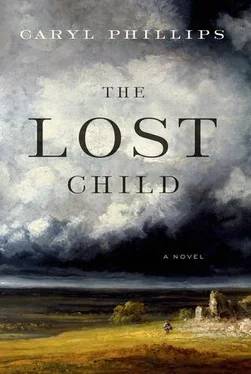* * *
Ben looked across the examination hall and saw Mandy scribbling away at her paper, and he was once again conscious of the fact that he had nothing to offer her in exchange for the ongoing gift of her family’s warmth and generosity. Since they had started going out with each other at the beginning of their second year, he had spent every vacation with her folks in Wiltshire. Her older brother was away in the army in Northern Ireland, and her father always reminded him that while Michael was fighting the good fight, they had plenty of room in the house. Ben had explained to Mandy about having been brought up in a foster home, and presumably she must have said something to her parents, for they had never asked any questions. If they were nonplussed by anything, he knew they would be respectful enough to ask Mandy and not him, but he wasn’t sure how much she would be able to help them out. She seemed to understand that talking about his mother and father, or his brother, was difficult for him to deal with, so she never raised the subject. When Mandy’s granny died, and she had to go back home for the funeral, he did, however, tell her that he had just the one memory of his own grandparents on his mother’s side. He must have been about six, and both he and his brother were tired out when they got to Wakefield, and so, even though it was still light outside, they both were bundled upstairs and into bed. Then, before either of them knew what was happening, they were soon back on a train again. Tommy fell fast asleep, but Ben remembered looking up into his mother’s face.
“Doesn’t your mam and dad want us to stay with them?”
His mother pulled him closer to her side.
“No, love, we were only visiting. We just popped in to say hello, and now we’re off to our own flat.”
Having announced this, his mother slammed the door shut on any further discussion of his grandparents, and as both he and Tommy eventually discovered, the idea of talking about family in general was completely off the agenda as far as their mother was concerned.
* * *
The waiter asks him if the food is to his liking, and he simply nods, for his mouth is full of pasta and meatballs. The fellow couldn’t have chosen a more inopportune moment to start quizzing him, but he doesn’t seem to notice and offers a quick, self-satisfied grin and then moves on to the next table, where he presumably asks the same question. Having walked around the town for the best part of two hours, during which time he kept himself mentally spry by browsing the displays in bookshop windows, he hurried back to the main street and took up his watch across the road from the examination building. He positioned himself halfway between the college and the teashop where he had ordered breakfast, but it soon dawned on him that either his timing was off and the students had already finished for the morning, or perhaps they were exiting out of some back entrance that he was unaware of. When a bus pulled up beside him, and an excitable driver shouted, “Well, you getting on or what, mate?” he registered that he should move. He mumbled an apology and took a step back from the bus stop, and then watched as the elaborate doors concertinaed shut with a cushioned thud. There was no point to his dilly-dallying in the street, so he decided to go and find the rather unpretentious-looking Italian restaurant overlooking the river that he had walked past this morning. He hadn’t troubled himself to inspect the menu, but the presence of a blackboard on the pavement in front of the establishment convinced him that the food would be fresh as it looked as if the chalked-up offerings changed from day to day.
This morning, before he left the hotel, the lady on the front desk had handed him a folded piece of paper that contained a message from his next-door neighbour Mrs. Barrett. Would he please, when he had a spare moment, telephone her? But, the message reassured him, there was “Nothing urgent.” Last year he had finally come to the conclusion that rattling around in a big semidetached house by himself was more aggravation than it was worth. It was the postman who, having witnessed him struggling down the driveway towards the rosebushes with his secateurs at the ready, pointed out to him that the pain in his knees might be alleviated by considering the advantages of a bungalow. His home had barely been on the market for a week before he found himself at the centre of a bidding war, which eventually concluded with his being offered well above his asking price. For a man now living on the combined efforts of his state and his teacher’s pensions, the added sum of money was a great bonus and enabled him to buy into a new development that was in a small village to the west of the town, where he soon discovered that most of the newcomers were either retirees like him or first-time buyers looking to get a foot on the bottom rung of the housing ladder. The bungalow next to his was occupied by a Mrs. Barrett, who had moved in a week prior to his arrival. Recently widowed with no children, and never having had to work a day in her life, she seemed a little lost, but she was very nicely mannered and had obviously been accustomed to having access to the resources necessary to keep herself looking in tiptop condition.
To begin with, she asked him if he’d be interested in joining her at church on Sunday morning, but he had to tell her straight that this wasn’t his thing. He did, however, suggest that he’d enjoy her company for an evening stroll to The Bulldog, where they might enjoy a half-pint, or whatever took her fancy. A month or so later, when his chest problems began to flare up again, a hangover from his childhood pneumonia, she began to regularly bring him soup and sandwiches with the crusts cut off, and she insisted on faffing about and doing the occasional bit of tidying up around the bungalow. He was soon back on his feet, but he now found himself taking her for a twice-weekly run out in his Ford Escort, usually to the supermarket in the town centre, where the prices were better, and as a result, he was forced to listen to her going on about her Alfred as if he had been the thirteenth disciple. Some part of him knew that he should be grateful that he had such a caring neighbour who clearly enjoyed his company, but this woman had bullied her way into his life, and he simply wasn’t ready to deal with another person and all her needs and foibles. While he was wrestling with his concern over how best to bring this up with her, he noticed that certain items were starting to disappear from his place and were suddenly making an appearance over at Mrs. Barrett’s bungalow. First, a carriage clock, and then the silver tankard that the school had presented him with on the occasion of his retirement, but because, during his illness, he’d given Mrs. Barrett the spare key to his bungalow, it was no mystery to him how his things were getting over there.
He’d bought a bottle of sweet wine from Asda with the express purpose of using it to help lubricate what he imagined might be a taxing conversation. It was a sunny afternoon, and they sat opposite each other on the garden chairs he’d brought with him from the old house, and they listened to the birds trilling and twittering in what he considered to be an annoying fashion. “To your good health,” he said. They clinked glasses, and he had to admit he’d never seen Mrs. Barrett looking so happy and contented. As a result, instead of admonishing her for her petty pilfering, or asking for the spare key back, he unexpectedly found himself telling her the story of how, not that long after he’d lost Ruth, he received the phone call from the secure hospital in London during which the woman told him that his daughter had taken an overdose of pills and he’d have to come down and identify the body. He asked the woman, “What, come down now? It’s after seven, and even if I leave right at this moment, I don’t think I can get down there before midnight.” The woman reassured him that there was no rush and tomorrow would be fine, but after he put down the phone, he sat in the gloom for nearly an hour, and then, worried that he was about to be overwhelmed by grief, he suddenly rose to his feet and grabbed his jacket. He went out to the car and drove down through the night to London, and once there he sat outside the hospital, with his driver’s seat reclined, until the gates opened at seven. It was a coloured nurse who greeted him at reception, and she ushered him into the hospital proper and steered him to a room where he had to make the identification.
Читать дальше












